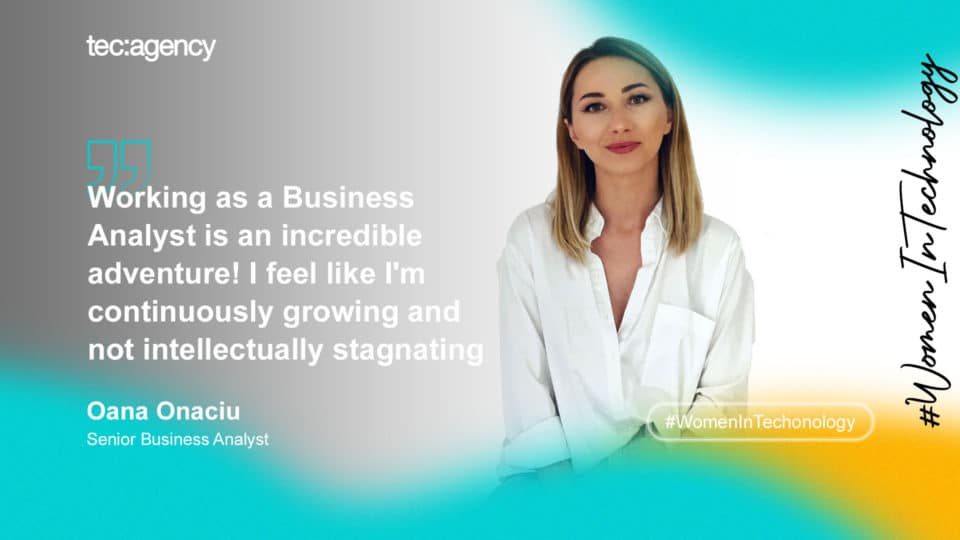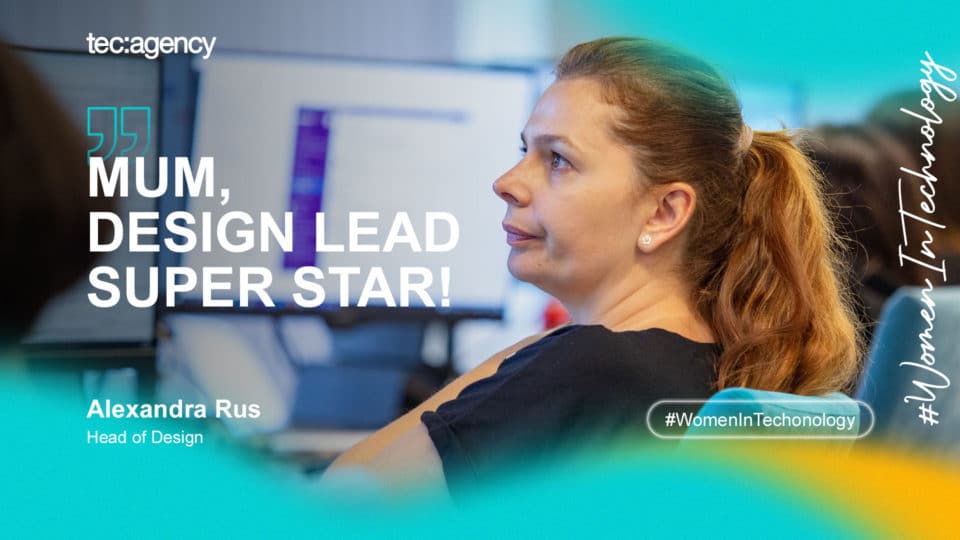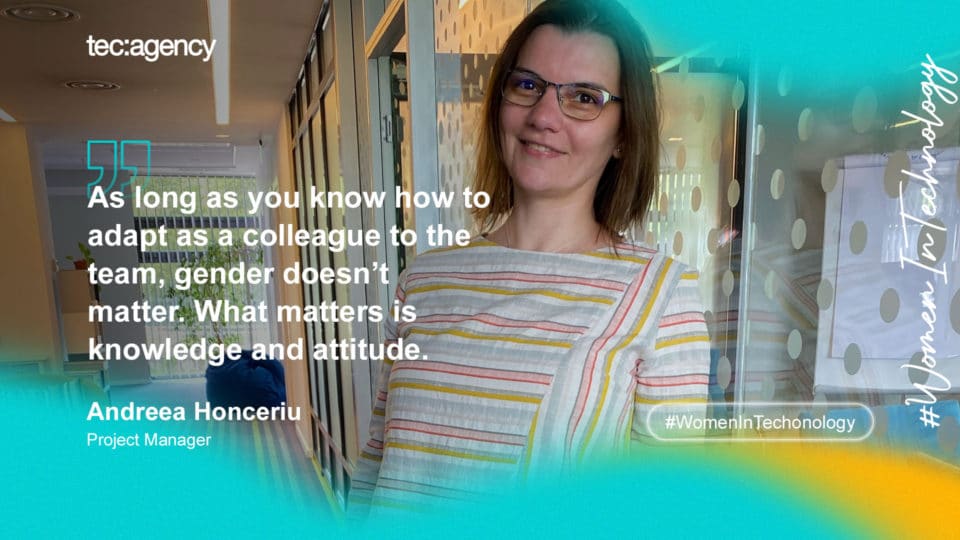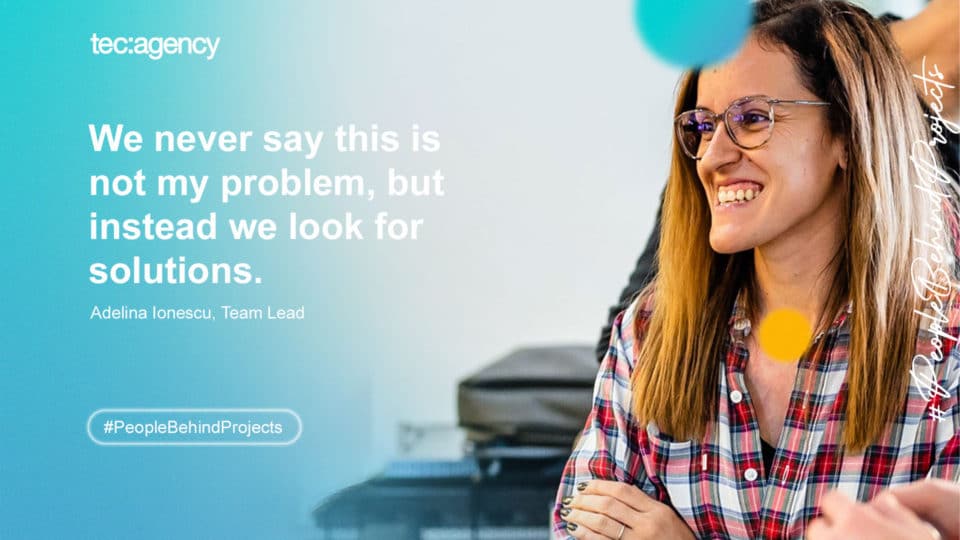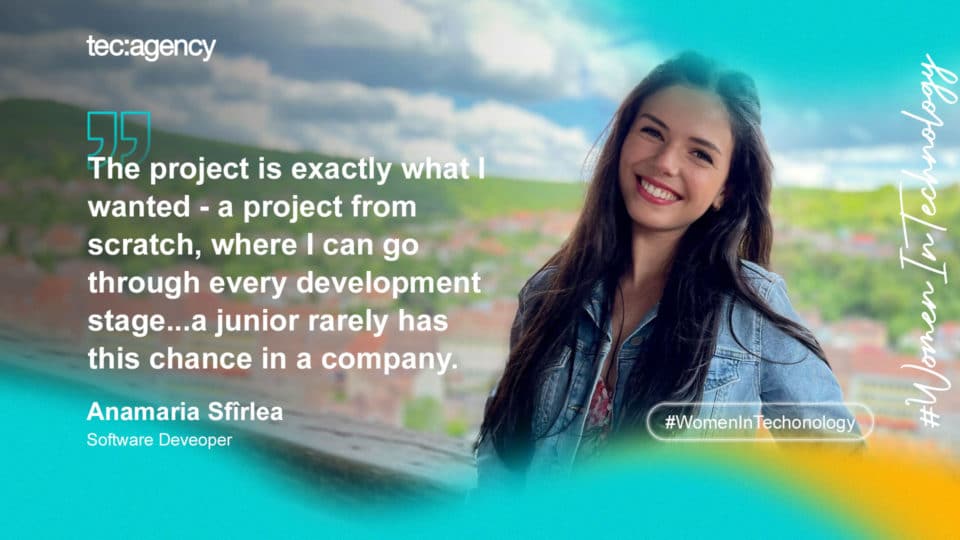-
What does a Business Analyst do? Interview with Oana Onaciu.
Have you wondered what a Business Analyst does? So did we! That’s why next on our #WomenInTechnology, we have Oana, a Senior Business Analyst who always has a way of brightening our days with her warm smile and joyfulness. In this article, she will provide an in-depth look at her career as a business analyst, her life choices, and the necessity of asking “why” in her line of work.

Tell us a bit about your journey, what made you become a BA (Business Analyst)?
After graduating from a literature university, I began my career as an interpreter and translator. At the time, this was what I aspired to, and it was my ideal job. I never anticipated that I would switch to a completely new profession and life.
I’ve always been a sociable, outgoing individual who enjoys interacting with others, with a bit of curiosity and an analytical mind. That is why I chose this area of work: to assist people in overcoming language barriers and communicating more effectively.
Long story short, I casually came across this role a couple of years ago and I started looking with interest into it. I did some research on what a business analyst does in this industry, I attended a few webinars, industry trainings, and became more and more interested in this role, so I started to apply for various positions, all with the goal of bringing my communication skills to a different level. And this is how I started my journey as a Business Analyst.
How would you describe your role as a business analyst if you had to?
Basically, the Business Analyst job is all about being nosy. Kidding. But one thing is certain: being a business analyst is far from boring. I have this feeling of never-ending evolution, of trying new things, and of continuous improvement, which is precisely what drew me to this profession. We need to ask a lot of questions, and as one of my clients put it, “The only bad question is the unasked one”.
The role of a BA, in my opinion, is to serve as a link between the technical team and what the client/business stakeholders want. The ability to ask the right questions at the right moment is a BA’s most crucial skill. To be curious and to have a large imagination for all possible circumstances. To assist the client in uncovering what they need, what they desire and, more significantly, why they desire it.
How can a business analyst assist in the improvement of a company?
The role of a business analyst is essential in improving a company since it saves time for both the development department and the client. And time is money, as we all know. A BA helps the developers by taking care of the meetings and the stakeholder communication and allowing them to focus on the actual development side of things.
It’s crucial to understand not just the business side, but also the technical side, in order to serve as a bridge between the team and the client. To be able to listen to what the customer wants from a business standpoint, to understand and to advise him, to assist them with solutions, and to know when and how to intervene in technical team meetings.
What other industries have you worked in as a BA?
Prior to joining TEC, I worked as a business analyst in industries such as finance, sustainability, automotive, and health care.
What’s the process when you’re given a new project?
The discovery workshop would be the initial step in any new project, this is how we pull the information from multiple sources from within the client’s organization and then we perform the analysis of the requirements gathered, a critical phase for the success of a project. Gathering the requirements is a challenging phase since there is a lot of information absorbed in a short amount of time, and you must understand the business very well, and know how to interpret and prioritize the requirements.
It’s also crucial to simplify them and then show the product’s scope to the top management so that strategic business decisions can be made.
What would you say is the biggest challenge from a BA’s perspective when starting a new project?
A BA, in my opinion, faces a number of obstacles, one of which is thoroughly comprehending the nature of the business in order to have a clear and complete understanding of the needs while beginning a new project. I normally begin by conducting research on the industry and the client’s business domain.
Another tough challenge in this role is the changes of the business needs or requirements, handling them and understanding where the limits are, in order to stay within the scope of the project, and how this will affect estimations or effort. And last but not least, to find the time in between the countless meetings to do some actual BA work.
What do you think the next steps are for someone working as a business analyst? (What can a BA grow into further in their career?)
Working as a BA is an incredible adventure, aside from the fact that I get to learn something new every day, literally every day, this makes me happy because I feel like I’m continuously growing and not intellectually stagnating. Usually, there are several transitions that a Business Analyst can go through from a junior BA up to a senior Product Manager. These are, however, subject to many differences that have to do with the way each and every company chooses to implement these specific Product Roles.
For the sake of the argument, you could go from junior BA to BA, then Senior BA, and afterwards transition to the more strategic side of things as a junior Product Manager, Product Manager, then Senior Product Manager. From there on, sky’s the limit. You can successfully fulfil roles such as Head of Department, CTO, CEO, or you could even start up your own company if you haven’t done it already by that time 🙂
What’s the difference between a business analyst and a product owner?
The distinction between these is highly dependent on the company you work for. For example, a product owner, as the name implies, works on their own product, and a business analyst works for an outsourcing company. The skills are the same, the work system is the same. The Product Owner is more business and customer-oriented, while the Business Analyst is often more tactical and focused on the project.
The business analyst is in charge of ensuring that what the customer wants and what the team is creating are in sync. The BA serves as a liaison between the business and technical teams, identifying gaps and assessing their impact.
However, given a normal BA’s training and talents, they’re usually qualified to perform parts of the PO’s duties as well. Most backlog management operations, as well as dividing large stories into smaller ones, modelling workflows and data, setting business rules, and dealing with non-functional requirements, are included. As a result, these two functions frequently overlap.
Think you could go back in time. What advice would you give to your 5 years ago self?
Most likely the advice I give myself on a regular basis. Everything happens at the right time. Be patient. If it doesn’t happen, it’s for a reason. So, I think, if I could magically go back in time, by the way, that would be so cool, I’d tell myself to be patient and to wait for things to happen naturally.
And finally, what piece of advice could you offer to the people that are starting their careers as a BA (Business Analyst)?
The most important piece of advice I could provide, and which would be great to consider, is to be patient. There are frustrating days and periods, with lots of meetings, but the great satisfaction you get when the product is built and comes into shape, and knowing that you contributed to it, makes it all worthwhile.
-
#WomenInTechnology – Alexandra Rus – Mum, Design Lead and Super Star!
As always, it’s a pleasure to showcase a member of our team and today it’s a special pleasure to introduce Alexandra Rus, known as Sandy, who is the Design Lead at TEC. We managed to steal some time off her busy schedule and got some insights on how to juggle the challenges of motherhood while leading a team in an IT company.
- Hi Sandy, thanks so much for taking the time to talk with us – we know you’re a very busy lady! What does a typical day look like for you?
“Hihi, there is no typical day when you have a 1-year baby, a 3-year toddler and a full day job! Usually, I wake up whenever the girls wake up – I haven’t had an alarm clock in the last 4 years or so… no need to!
First, I take care of the girl’s needs, washing, getting ready for kindergarten, making breakfast and after the nanny arrives, I can take some time for myself.
Usually, when I get to the office I start my day with daily meetings, looking at the projects I’m allocated, and then I dive into the technical duties, prioritizing the tasks as they arrive. The end of the day finds me with my family either at home or in the park or having dinner in the city.”
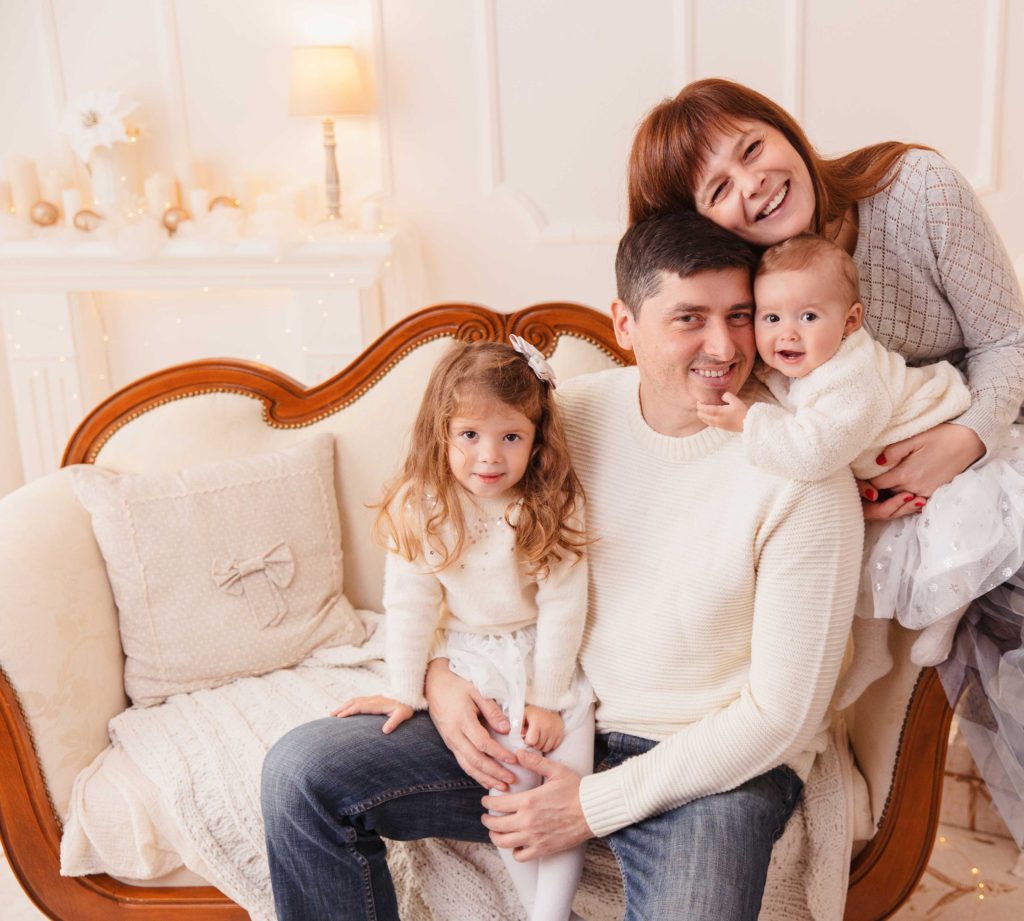
2. Before your current role, you worked for TEC as a UI/UX Design Lead – tell us a bit about your experience in the different roles you’ve had with TEC?
“It is true I started at TEC as a UI/UX designer but then I was needed more as a front-end developer so I kind of hit a pause on the UI/UX job… but from time to time my design skills are needed and it is always a pleasure to create new things.
This is only a temporary pause because I plan to hit play again real soon. As a Design Lead, I’m also involved in the bidding process for new projects and that is also a challenging part of the job.”
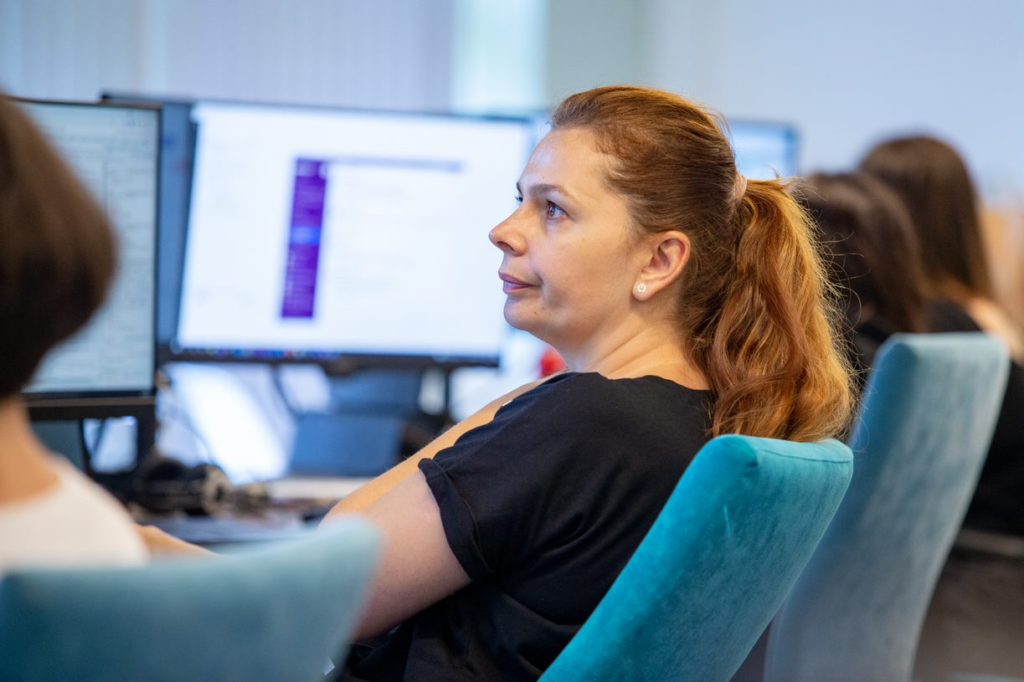
3. Did you always know that working in technology was what you wanted to do?
“Good question. I guess I’ve always had a thing for technology, my favourite school subject was Maths and I always enjoyed doing my Maths homework. But I also admired my father’s army uniform and that made me think of a career in uniform.
At that time, there was no place for women in the Army or in the Police Academy and so I was looking at enrolling in the Romanian Intelligence Service since they had five places allocated for women but eventually decided it wasn’t for me and switched my focus back to Maths.
I went back to University in Cluj and I chose to follow UTCN – Computer Science for five years. And now I’m an Engineer and I love it. Even at home, I’m the one that changes the batteries and fixes things with a screwdriver.”
4. What made you study computer science?
“To be honest, computer science wasn’t my heart’s choice, but it was the decision I made at the time when looking at what would give me the best possible career. I’m glad I chose to study computer science because it has decided my life’s path so far. It wasn’t my heart’s choice as a topic to study, but it is where I found my heart’s choice in life.”
5. What do you love most about your job and what do you find the most challenging?
“I love everything about my job, I love the people involved, I love the projects, I love the clients, I love the office, I love my workstation. The most difficult thing for me is time management. Having the position that I have, I’m involved in lots of things and sometimes it’s hard to schedule everything. I want to please everybody, and I feel bad when I’m behind with my tasks.”
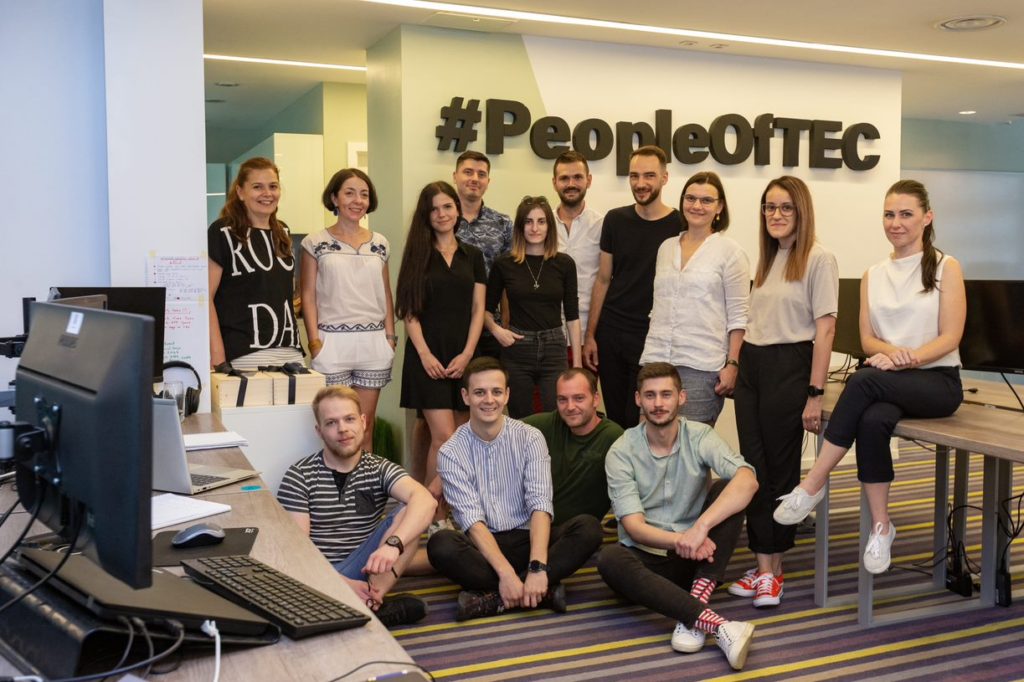
6. What it’s like to be a woman in tech? What are the biggest challenges you have had to overcome in terms of inequality and how have things changed during your career?
“I guess the challenges that came were mostly from a mother’s point of view not as a woman in tech. I am one of the lucky women that have help from my mother and a nanny, and this helped me to get back in the field after 3 months of maternity with each girl. At first as part-time and when the girls got bigger as full time. It is a challenge to get back to the office when you are still nursing. But we were sneaky and moved-in in the same building with the office, to make things easier.”
7. Do you feel that there is a gender imbalance in the office at the present? Or in the industry, for that matter?
“Here at TEC I think it makes no difference if you are a woman or a man, I don’t have the exact numbers, but we are pretty equal in numbers”
8. What do you think is the best part of being a woman in the tech industry?
“Well, the best part in any industry, regardless of your gender, should be to enjoy what you are doing. If you are in a place where you feel good about how things are working and if you enjoy the time spent at the office, then it makes no difference if you work in the tech industry or not.
At the beginning yes… I felt strong that I graduated from a five-year university in Computer Science but then (2006) we were less in numbers in this area. Now, the jobs in the tech industry are open to any gender and here, we make no difference if the candidate that comes to the interview is a female or a male.”
9. What advice would you give to a woman considering a career in the tech industry?
“Go for IT! Don’t be afraid to show your potential.”
Of course, working while being a mom may present some challenges and you may also have some bad days, but as we learned from Sandy’s experience, there is nothing you cannot do! Choose to be the change you want to see in the world. Be self-assured, select a field that interests you, and pursue it!
If you’re seeking a job in the tech business, have a look at our current openings and consider joining our team.
-
#WomenInTechnology – Talking to Andreea Honceriu
We are continuing our #WomenInTechnology series with our restless Andreea Honceriu, a dedicated and hard-working project manager on one of our biggest projects. You may have heard about her from the ClujLife article or even worked with her in one of your previous projects – she has quite an experience behind.
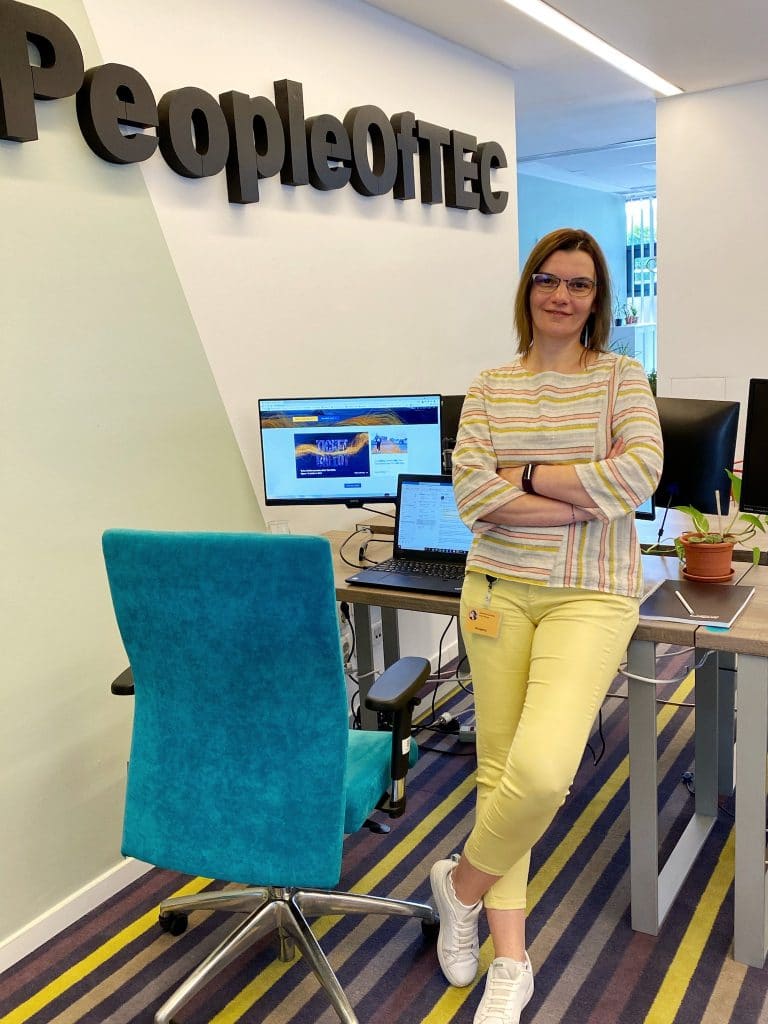
Besides the responsibility of coordinating an entire team, she also makes sure things go according to the plan, exercising her outstanding stewardship skills and keeping customers pleased. Upon her arrival in the company, she brought her experience and knowledge, acquired in a span of 17 years working in two large IT companies in Cluj-Napoca.
Looking back to the first day she accepted a job in this field, on a testing position she was quite a novice and she didn’t know exactly what to expect. She did have a major in sciences, after all, both of her parents are maths and physics teachers, but the real world of IT had a very different flavour than what she experienced in school. In essence, she built her career from scratch she says, moving across several roles, from testing, to test management, project management, and ultimately business development. She’s found her element.
You may wonder at this point, why TEC, why now?
“I really wanted to work in a company that is not a corporation. I believe with all my heart that in companies such as TEC you have more room to experiment, to do things the way you want, and you have freedom. There are some basic rules, of course, but you don’t have that rigidity of procedures, specific to corporations. My greatest satisfaction is that I can express my opinion and it is listened to. And that applies to anyone in the company. This is a premise from which we always start at TEC – if you have something to say, say it, because there are always ears that listen. Moreover, I am a solution person and many of my colleagues have the same mentality, which helps us to evolve professionally and personally. I like the involvement of my colleagues, the common desire is to do a lot of things, to give your soul for what you think. I think that what makes the company work this good – the great energy of the people and a common drive that is hard to replicate.”
The project she is responsible for is a one-week-long event in July, and in the interview, she was given a fair warning that during the event she would spend a lot of time in the office, working almost 24/7 very likely spend a lot of time in the office, pulling a few all-nighters to assist the live event. When she heard about the number of hours that her colleagues spent at the last event, she could not believe it. Until the event happened.
“I didn’t think I could spend so much time at work without realizing that 15 hours had passed or without wanting to go home. We felt a very close connection between us, we had the feeling that we could move the mountains together. This enthusiasm isn’t just mine, but ours, everyones. The experience was great for me.”
Andreea finds it crucial to get to know your teammates, professionally but also personally, hear their jokes, their intricacies, their life stories. We are the sum total of things that happen to us, at all levels. After all, she says, we are all human and evolve in different contexts, at different times, and we are each motivated by completely different things.
As a team leader, I believe you need to take the pulse of your colleagues, find out what’s their state of mind and be ready to help. It’s important to know how to speak your mind and offer feedback.
“The human interaction in which I tell you what I think, and you do too, in which I explain my point of view, and you explain yours is what helps us evolve as human beings. I have given some good feedback in my professional life, but some less good as well, and I have learned over time that the one who gives feedback has a duty to help the other to grow, not just to deliver information. At the same time, the recipient must be open enough to understand that what is presented, is the other’s perception of reality, not the absolute reality. To understand that in a certain context, an action of his has triggered something in interlocutor. Take feedback at home, accept it or not, it’s strictly your decision, but from any feedback, you can learn something.”
When she entered the IT field, leadership and decision-making positions in companies had been held by men. Only in the last 10 years, things have changed. But not because someone decided to put women in leadership positions at some point, but simply because she believes that women have had the freedom to develop professionally enough to show that they are just as capable as men.
“I never felt like I was in any way disadvantaged in my 18-year career in IT because I was a woman, in spite of having 2 maternity leaves. I left, but when I returned, I resumed from where I left off. In addition, as a parent, you are facing many extra tasks and urgent situations. I did not feel that I was disadvantaged by this, on the contrary, I saw that people appreciate that in addition to having two children, I can be a good professional. From my point of view, as long as you know how to adapt as a colleague to the team you belong to, gender doesn’t matter, what matters is knowledge and attitude. I can go so far as to say that attitude matters more than knowledge. The latter can be acquired.”
-
#PeopleBehindProjects – Talking with Adelina Ionescu
We go further with our #PeopleBehindProjects campaign, and we invite you to meet Adelina or maybe you previously know her from the ClujLife, a sociable person, and popular employee who gets on well with her teammates. She has been with TEC: Digital Agency for 6 years and, during this time, she’s had the chance to work on several projects and with various technologies, an opportunity that always brought her great joy.
Adelina is a Full Stack Developer and she is also a team leader. In her first years with the company, she worked on the websites for leading music festivals, UNTOLD and Neversea, and then she started working on the digital experience of The Open, the R&A’s flagship event, a project on which she works as a Technical Lead.
The Open is one of the most prestigious tournaments in golf with a worldwide audience and TEC provide an extensive team of technical engineers, project managers, testers, developers, architects to work on the project, both prior and during the event. The team is hands-on, working round the clock ready to intervene if necessary to solve any problem that could impact the event.
To give you an idea of scale, at the 2019 Open, there were 7 million unique visitors during the last game of the Royal Portrush Championship, 850+ pages accessed, 180K hours of video and audio content, and billions of server requests during the four days of the event.
TEC is responsible for everything related to the digital experience of the event – everything from live scores, live blogs, virtual media center, live streaming, and also on ticketing and marketing support.
“Every year preparations for managing The Open begin in May, with a series of test weeks. TEC tests cover all the different main moments of the event. This is done by simulating based on the database from past years, after which we see what needs to be changed or adapted. The list of tasks is then extracted and prioritized. We test, retest and, document the process. This year (2021) we had very few problems, but those we encountered were solved quickly because everyone is responsible for a certain project area, no one is waiting to be told what to do. Last year (2020) there were about 4 problems at once with the external platforms, and our good organization within the team was vital. But those are the good times; I like those. I don’t practice any kind of extreme sports, for me this is the adrenaline rush I seek. The one I can control to a certain extent, on which I can intervene.“
Teamwork makes the dream work.
Beyond the technical challenges that may arise, the pressure during the event puts the members of the team face to face to other kinds of challenges – the connections between them. However, precisely during these crunch times, in which you may not always realize the tone you use and the looks you throw, the deepest connections are made between the members of the team. And this is precise because the experience of the event shows them the true meaning of the word “team”, this event mobilizes them and unites them.
“We never say this is not my problem, instead, we look for solutions. And if it’s the responsibility of a third party, we still come up with ideas. At TEC: Digital Agency you have freedom, you just have to speak up. Our focus is to find solutions, not to look for culprits or to complain that it did not happen.“
Talking to every member of the team, you get the gist of how proactive everyone is. Adelina says that it helped that we started as a smaller company, but also the fact that the people who later joined TEC: Digital Agency moulded themselves to the existing core and they have adopted their desire to do more.
“What I really like about TEC is the environment and the way we do our job here. Here you are involved on a larger scale, you don’t just do one thing. Moreover, you are listened to regardless of your position. You can’t always do something, but you know you spoke your mind and that you were heard. Also, you may not find your place on a project or team, but at TEC you can always change your career path. I feel that you can always go with an open heart to someone to ask for help, you have no obstacles, and you always get a piece of advice.“
Sure, most of us find fulfilment in the work we do, but how many of us feel we are at the right time and place?
-
#WomenInTechnology – Talking to Anamaria Sfîrlea
Did you know that only 5.31% of IT Specialists are women?
Gender imbalance in the workplace was a problem that has been debated since the beginning of the century. Now so many women are working, that it is quite rare not to see at least one woman in every domain.
Women are very remarkable in what they do. They stand out through their hard work, ambition, perseverance, and amazing results. Our colleague Anamaria is like that. You may have met her in a previous ClujLife article. She juggles being a developer at TEC and attending master’s courses at the Faculty of Mathematics and Informatics from Cluj-Napoca.
For Ana, school always came first, she didn’t think for a moment to get a job while attending college classes. At the end of year two, she did an internship, but it was during the summer. During the pandemic, she joined the TEC team in the fall of 2020, after a well-deserved summer vacation. She started looking for a job with the desire to work with different technologies, but she felt so great during the technical interview that the technology stack wasn’t all that important in the end.
My mother is a teacher and she raised me and my brother with the idea in mind that school and education are the most important things. I’ve always seen school as a job. Even if I didn’t get paid, that was my job and I had to take it seriously, I had to give everything I could, because otherwise I couldn’t be happy with myself. My work schedule is flexible, and this helps a lot with school. There was always understanding if I needed to take an exam or attend an important course. And this was made clear to me from the very beginning – that the company values our education and us completing our studies. For now, I want to learn as much as possible, to expand my knowledge related to the practical part of my job. In college I receive a lot of theoretical information, but it does not compare at all with what is happening in my actual job.
In the beginning, Anamaria was assigned to a big project. She learned, tried to integrate and understand how things work. She told us that she felt very quickly treated as an equal, not as a “new colleague”, and the worries related to the fact that in TEC people work mostly remote disappeared after the first week. Initially, she was slightly stressed that she did not know her colleagues and that she would not know to whom to turn to in case she needed help, but she immediately realized that many were aware of this and they contacted her, offering to help her. Later, Ana was assigned to a smaller project, about which she spoke with great enthusiasm.
The project is exactly what I wanted – a project from scratch, where I can go through every development stage. And a junior developer rarely has this chance in a company. I learned a lot while having to solve problems and through many knowledge-sharing sessions with my colleagues. Me and another developer started this project, along the way we were joined by others. Now that we finished this project, when I look through the code and see things I implemented, my heart grows. I like to think that I have an essential role in the team I am part of.
In the months spent at TEC, Anamaria realized that the human side is very important in the work environment. Having the experience of an internship in a corporation, she was pleasantly surprised to discover that here, the focus is mainly on people.
Unlike large corporations, where procedures matter a lot, here people come first. The work environment at TEC is dynamic, challenging and I didn’t get bored in all the months I spent here and I didn’t get to consider my work a routine. I am a sensible person and if I feel stress or pressure from others, I can’t cope anymore. It is important to have people around me in whose presence I can feel comfortable, especially since there are days in which I talk more with my colleagues than with my family. If you decide to join us, you can expect very friendly colleagues, willing to help you, but also a place where you can learn a lot about what IT projects mean.
Of course, the conversation with Anamaria could not end without touching the main topic of this article, what it is like to be a woman in the IT field.
I was really amazed when I saw how many women are working at TEC when I arrived. I also remember my first call with the project management team – only women were present. It’s a general perception that the IT industry is male-dominated, but it’s not. IT is not a place of discrimination, nor have I ever thought of any difference for us as women.
Even though studies show that only 5.31% of IT specialists are women, in our company, there is a rate of 43% female developers.
